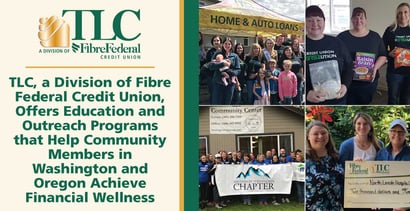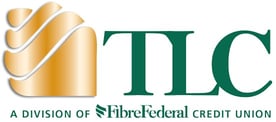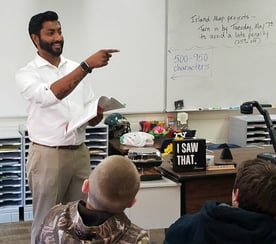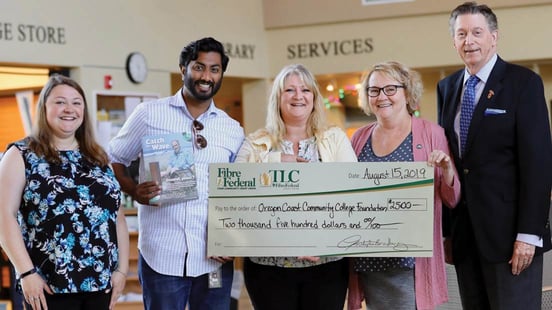

In a Nutshell: TLC, a Division of Fibre Federal Credit Union, is focused on providing communities with the knowledge they need to make sound financial decisions. TLC offers presentations, seminars, and account incentives that help people of all ages gain valuable knowledge and establish positive financial habits. The credit union also supports communities and their members through charitable donations, employee volunteerism, and scholarships for college hopefuls. For those efforts, TLC has earned our Editor’s Choice™ Award for Community Commitment.
In 1957, members of the Clatsop Tillamook Chapter of the Oregon Educational Association formed a credit union. Over the intervening years, a series of mergers yielded the Tillamook, Lincoln, and Clatsop Credit Union — which is now known as TLC. In 2015, TLC joined with Fibre Federal Credit Union, established in 1937. That acquisition greatly expanded the benefits that TLC offers to its members.

Today, Fibre Federal Credit Union and TLC holds more than $1 billion in assets and serves more than 100,000 members. In 2019, the credit union will open its 15th branch to better serve the people in the seven Washington and Oregon counties in its footprint. But despite its growth, Fibre Federal Credit Union and TLC’s mission has remained the same: to leverage education to improve people’s financial lives.
“We truly believe that by doing good, we will do well. It’s not just for the organization but also for the community,” said Zaheen Khan, Financial Education Coordinator at TLC. “We want to make sure we are helping people create that brighter future for all of our communities and our residents. It’s been proven time and again that education plays a big role.”
TLC strives to educate children and adults throughout its service areas, and it offers incentives that allow students to have fun while gaining critical financial literacy skills and pursuing higher education.
For its dedication to education, volunteerism, and philanthropy, TLC has earned our Editor’s Choice™ Award for Community Commitment.
Reality Fairs Introduce Students to Adult Financial Life
Within a few years, many high school students will enter the workforce and become responsible for their own day-to-day expenses. That’s why TLC hosts reality fairs that simulate that daily life to help them prepare for the monumental transition.
“Those are a lot of fun,” Khan said. “It opens up the students’ eyes, and some faculty members’ as well. Life is expensive because everything costs money.”
While other simulations may assign students a specific profession or lifestyle, TLC’s reality fairs leave those decisions to the students — as long as they’re paying attention. Those who zone out often receive a valuable lesson in giving due diligence regarding financial matters.

Zaheen Khan, Financial Education Coordinator at TLC, teaches local students about financial responsibility after high school.
“We send out links, and the students choose what they want to do. The ones that pay attention can choose a surgeon or another high-paying job. But some of the students don’t end up choosing, so we give them minimum wage jobs,” Khan said. “Often, those end up being part-time jobs, and they realize how expensive it can be.”
The reality fair includes 12 to 15 booths, depending on the venue. Each booth represents an expense, including transportation, housing, clothing, or food, and offers tiers of goods and services for different budgets.
Fair coordinators and volunteers intentionally make the simulation challenging by trying to upsell students, who will face the same tactics when they are adults deciding how to spend their money.
“We try to get them to go over budget,” Khan said. “At the very end, they sit down with a financial coach who goes through each of their decisions and talks about it. The coach identifies what decisions were good, what could have been better, and if they’re over or under budget.”
Education and Incentives Help People of All Ages Develop Positive Habits
Through TLC’s reality fairs, many students come to realize just how expensive life can be. Khan also noted that many of the participants expressed a common sentiment: that their parents don’t discuss financial matters with them.
To bolster financial literacy at all stages of life — from kindergartners to senior citizens — TLC prioritizes educational outreach in its communities. In public schools, it partners with Junior Achievement, a nonprofit organization that helps students achieve work readiness, financial literacy, and develop entrepreneurship skills. TLC representatives assist that mission by speaking to students about finances and money management.
To help younger students put this knowledge into practice, TLC offers specialized youth accounts. Children 11 and younger can open Cash Club accounts, which provide higher dividends and prizes that reward deposits and savings. For each of these accounts opened, TLC also donates $5 to a local animal shelter. And those donations totaled $5,000 in 2018.
“We try to dispel the notion that banking is a scary situation,” Khan said. “We want to make things fun and enjoyable.”

Cash Club and Student Savings accounts help kids learn how to manage their money as they grow.
As children grow, TLC scales its account incentives. Cash Club accounts automatically upgrade to Student Savings accounts when holders turn 12. Those accounts distribute prizes in the form of gift cards, and they reward account holders for each ‘A’ on their report cards. The accounts also provide access to checking and debit services as well as credit cards.
At the other end of the age spectrum, TLC recognizes that adults have different needs and concerns. The credit union’s educational resources for senior citizens, for example, tend to emphasize online safety, fraud awareness and avoidance, and protecting financial assets.
And for all ages in between, TLC offers free access to GreenPath Financial’s wellness counseling as well as re-entry programs. These help people who have made poor financial choices in the past rebuild credit and regain solvency.
The credit union recognizes that helping adults master their finances is a win-win situation. In addition to enjoying financial well-being themselves, adults can pass their knowledge along to their children.
“We can teach the kids all day, but if it doesn’t go into the household and parents aren’t reassuring these children, it’s a moot point,” Khan said.
Philanthropic Efforts Help Charitable Organizations and Fund College Careers
In 2018, Fibre and TLC contributed more than $220,000 to causes in the communities it serves. Additionally, 192 of its employees donated their time by participating in local projects and events.
“Anything about the community, we tend to be a part of,” Khan said. “If we hear of something, we go and do it. We donated to 217 different organizations last year, and I’m pretty sure we’re going to do more this year.”
TLC is dedicated to helping local students pursue higher education. That’s why the credit union offers scholarships to its members who are college-bound. The students write and submit essays, and the best ones are awarded funding for further education.

TLC supports educational institutions and provides scholarships for area students.
The credit union also offers Matched Education Savings Accounts (MESA). For each $1 a student deposits, Northwest MESA matches it with $3. These accounts and scholarships help students reach their college goals, prepare themselves for a brighter financial future, and leverage their education to manage their earnings after graduation.
Khan himself is a former bank employee, and TLC is the first credit union he has worked for. He said that gives him a unique perspective on the difference between the institutions when it comes to community well-being.
“It is night and day,” he said. “We give back to the community much more so than banks do. Banks tend to do it for their tax write-offs. But we care about our communities, and we love to see our people do well.”
Responding to Community Needs by Delivering Needed Educational Resources
Ensuring that community members enjoy financial wellness depends on meeting each community’s specific needs. And TLC always strives to learn more about those needs and develop programs to meet them.
“Right now, lack of affordable housing is a big issue with residents in many communities, so we’re taking steps to battle that. Of course, we think education is a big part of that,” Khan said. “We’re working in different communities with members and seeing how we can address the issue by starting small and working our way up.”
TLC will continue to provide educational resources to schools, but it is also advocating to establish financial literacy more firmly in the education system. Rather than restricting it to special events and presentations, Khan believes students would be best served if financial literacy were a component of their curriculum.
“Our goal is to make financial literacy a requirement to graduate,” he said. “I’m working with superintendents in a few different counties.”
But an effective financial education still depends on reinforcing lessons at home. So TLC continues to focus on adult education that enables parents to establish that positive feedback loop.
“We’re working with a few different community leaders and seeing how we can continue that education at home,” Khan said. “We have a few different networking groups that are on board with it, so we just need to figure out what that will look like.”
Advertiser Disclosure
BadCredit.org is a free online resource that offers valuable content and comparison services to users. To keep this resource 100% free for users, we receive advertising compensation from the financial products listed on this page. Along with key review factors, this compensation may impact how and where products appear on the page (including, for example, the order in which they appear). BadCredit.org does not include listings for all financial products.
Our Editorial Review Policy
Our site is committed to publishing independent, accurate content guided by strict editorial guidelines. Before articles and reviews are published on our site, they undergo a thorough review process performed by a team of independent editors and subject-matter experts to ensure the content’s accuracy, timeliness, and impartiality. Our editorial team is separate and independent of our site’s advertisers, and the opinions they express on our site are their own. To read more about our team members and their editorial backgrounds, please visit our site’s About page.
